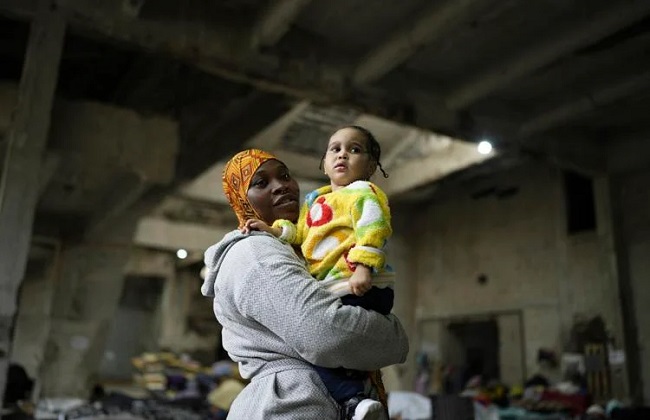
In a crowded shelter on the outskirts of Beirut, Isatta Bah cradles her baby, Blessing, as she waits for an exit visa to return to Sierra Leone. The 24-year-old endured what she described as exploitative work conditions, sexual violence, and the ravages of Lebanon’s recent war.
“My time in Lebanon has been very hard. I just want to go home,” Bah said.
Bah is one of hundreds of migrant workers stranded in Lebanon, seeking repatriation after a ceasefire ended the 14-month conflict between Hezbollah and Israel.
Attracted by promises of stable jobs and decent pay, many migrants enter Lebanon under the controversial Kafala sponsorship system. However, the system, often criticized by human rights groups, leaves workers vulnerable to exploitation, including withheld wages and confiscated passports.
Bah’s ordeal began in 2022 when she arrived in Lebanon, expecting to work in a supermarket for $200 per month. Instead, she was sent to care for an elderly woman. Within weeks, her 3-year-old son back in Sierra Leone passed away, and she wasn’t allowed time to grieve. Bah fled her employer’s home but left behind her passport and documents.
Her situation worsened when she and five housemates were abducted and raped after being misled by a taxi driver. The trauma stayed with her, and two months later, she discovered she was pregnant.
The war added to her hardships. When Israeli strikes targeted Beirut’s southern suburbs in September, Bah fled on foot with her baby and friends. Since October 2023, an estimated 37 migrant workers have died and 150 have been injured, according to the U.N.’s International Organization for Migration (IOM).
Displaced and vulnerable, many migrants found limited support. Most government shelters refused to house non-Lebanese, said activist Dea Hajj Shaheen. She and other volunteers transformed an abandoned car dealership into a shelter for over 200 Sierra Leonean women, including Bah.
Despite its modest conditions, the shelter provided safety and community. Women cooked together, danced to music, and even fashioned a Christmas tree from sticks. However, challenges persist as many lack the necessary documents to leave Lebanon.
“We had to arrange exit permits, immigration clearances, and travel documents for children,” said Shaheen, who facilitated the repatriation of 120 women and children with IOM’s help last month.
IOM reports over 10,000 requests for repatriation, a fraction of the 175,000 migrant workers in Lebanon. As of late November, the organization had assisted over 400 people in returning home, including charter flights for migrants from Bangladesh and Sierra Leone.
On Nov. 19, joy filled Beirut’s airport as Sierra Leonean women celebrated their long-awaited departure. “Life in Lebanon was tough, but I’m thrilled to go home,” said Amanata Thullah, who spent four years in the country.
While many left, Bah remains at the shelter, awaiting her turn. After initial delays due to missing documents for her baby, a lawyer waived the requirements, clearing her path for repatriation.
“I dream of continuing my education and studying computer science,” Bah said, smiling at her baby. “Blessing gives me hope and joy. Watching her grow reminds me that there’s still something beautiful to hold on to.”

